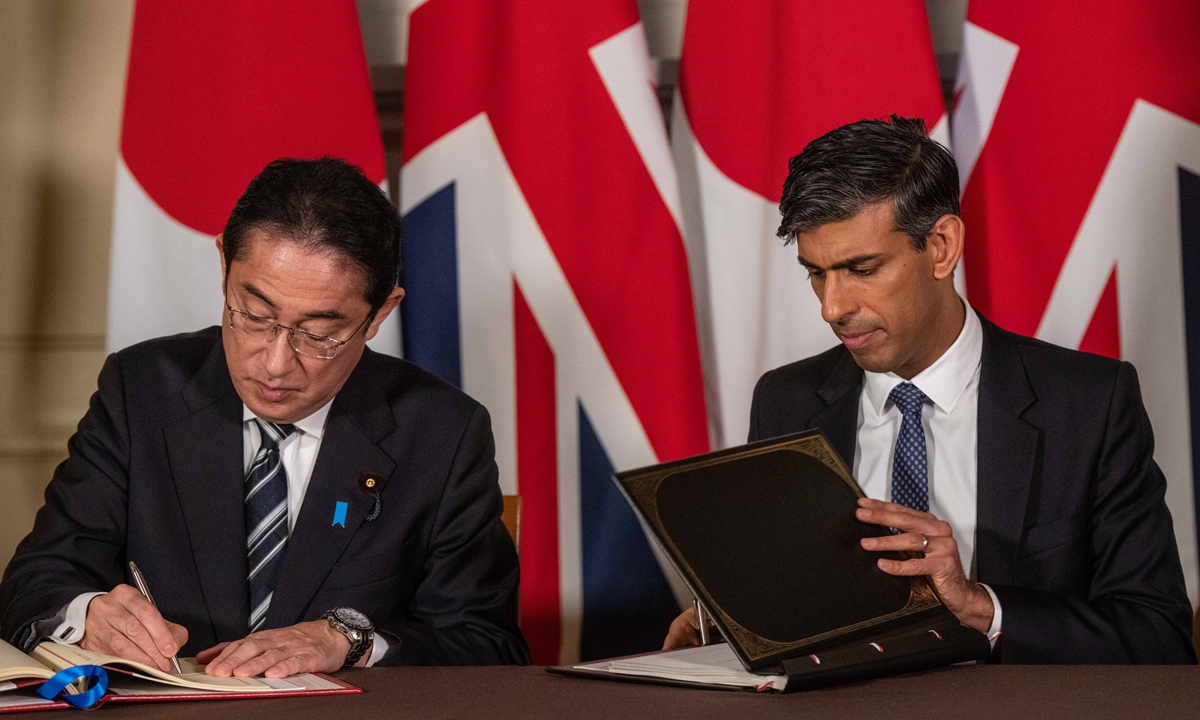Even with landmark bilateral defense agreement, dream of empire impossible for declining UK, Japan

Rishi Sunak (right), British prime minister, and Fumio Kishida, Japanese prime minister, during the signing of a defence agreement at the Tower of London in London, UK, on Wednesday. Photo: VCG
By strengthening their military cooperation in the Asia-Pacific region, London and Tokyo hope to enhance their presence and influence and dream of again becoming empires as they did or tried to a century ago. However, their geopolitical ambitions to dominate the Asia-Pacific and plans to disrupt its order will end up being a daydream, no matter how hard the US supports them.
British Prime Minister Rishi Sunak and Japanese Prime Minister Fumio Kishida, who was visiting London, signed a reciprocal access agreement (RAA) on Wednesday that allows both countries to deploy forces on each other's soil. The pact is considered "the most important defense treaty" between Britain and Japan since 1902 when they signed the Anglo-Japanese Alliance. Britain is also the first European country to have an RAA with Japan, media reported.
It is not surprising that the UK and Japan have made such a move. The two countries share strong similarities in values and political systems. Both nations have arguably the strongest ties with the US among all of Washington's allies. Besides, they see China as a major challenge in the Asia-Pacific region.
Most importantly, both countries have huge ambitions in the region. Under the Global Britain strategy, London is following in Washington's footsteps to tilt back to the Asia-Pacific. It has deployed cooperation with countries around China with different focuses. On the other hand, regarding itself as an Asian power, Tokyo wants to compete for dominance in the Asia-Pacific region. And one of the ways to enhance its influence and say in the region is through the strengthening of its military power.
In addition, experts told the Global Times that the US plays a certain role in bringing Japan and Britain to sign an RAA. It is highly possible that Washington has been pushing for such enhanced defense cooperation between London and Tokyo because the former is glad to see more British military presence in the Asia-Pacific region and Japan with a more powerful military. This will facilitate the US' advancement of a regional strategy to confront China and contain its development.
Previously, through the AUKUS pact, the UK has successfully intervened in the Asia-Pacific to intensify its threats and provocations against China. Now the Japan-UK RAA openly welcomes more British presence into the region. But since Tokyo and London have been tied closely to the US chariot, this will pose a greater threat to the security and peace of the entire region and regional countries, including China.
Both the UK and Japan are, in fact, "down-and-out powers": One is an ex-empire on which the sun has long set, while the "rising sun" of the other is having difficulty to rise again. They have ambitions but no strength to support them. They expect synergy from their bunch-up, which is almost impossible for two countries deep in decline.
London and Tokyo also seek to achieve their goals of becoming global powers by following Washington's global strategy. However, the strategy has revealed its true color of attempting to maintain US world hegemony, which is questioned and even rejected by many regional countries. Therefore, it has absolutely no future in the Asia-Pacific. Led by the wrong approach, the efforts of Britain and Japan will be in vain.
Even with Washington's tacit approval and endorsement for the two countries to join forces, as the US is almost unable to handle its own issues, how long can such support sustain? In the end, it will be nothing more than an empty slogan to kidnap Japan and Britain onto the US' anti-China chariot, leaving the two countries accused of stirring up the regional order through bilateral defense cooperation.
We should not worry if the UK-Japan RAA will lead to similar moves of defense cooperation from other US allies, especially those in the Asia-Pacific region. Li Guanjie, a research fellow from the Shanghai Academy of Global Governance and Area Studies, said the necessity and urgency of establishing such a defense agreement between other US allies are less strong than the ones between London and Tokyo. When their interests are involved, these countries will carefully choose the object and content of cooperation. And when they see how the UK-Japan RAA worsens the regional situation, Asia-Pacific countries are unlikely to go down the same path.

